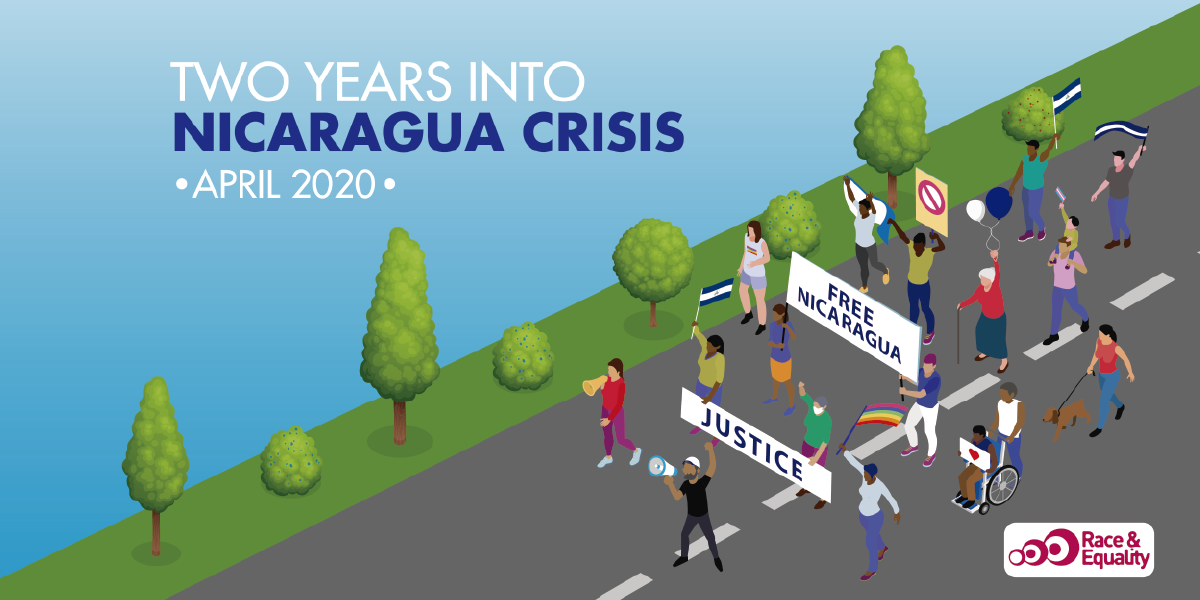Two Years of Crisis in Nicaragua: Impunity and Persistence of Human Rights Violations in a Country Now Confronting COVID-19
Washington, DC, April 17, 2020 – This April marks two years of a human rights crisis in Nicaragua, a watershed moment in the recent history of this Central American country, […]

Washington, DC, April 17, 2020 – This April marks two years of a human rights crisis in Nicaragua, a watershed moment in the recent history of this Central American country, where grave human rights violations persist to this day with consequences for the lives, physical integrity, and individual freedom of Nicaraguans, especially those who defend human rights and express their political opinions or perform independent journalism, and an opposition that confronts wrongful restrictions imposed by the regime on the exercise of their political rights.
In the 24 months since that April 18th that began a peaceful rebellion, and in the face of no responses forthcoming from the State, the three basic demands of the citizenry remain in effect: freedom for political prisoners and the reestablishment of Constitutional freedoms, rights, and guarantees; justice for the victims of repression [and] guarantees of reparations and no repetition; and democracy for the country.
To date, selective repression continues in Nicaragua, with impunity persisting for those responsible for the human rights violations, some of which the Interdisciplinary Group of Independent Experts (GIEI, for its initials in Spanish) of the Inter-American Commission on Human Rights (IACHR) warned might constitute crimes against humanity. There continue to be some 61 citizens detained in the country’s jails for political motives and the arrests continue to transpire, with the most recent being of former prisoners and organized university students.
On the Caribbean side of Nicaragua, more than 800 indigenous people have been forcibly displaced from their communities, representing the occupation by settlers of at least 23,243 hectares of cultivated land, according to the Center for Justice and Human Rights of the Atlantic Coast of Nicaragua (CEJUDHCAN).
Freedom of the press has also been restricted. Since 2018, the Violeta Barrios de Chamorro Foundation has reported more than 2,000 violations of freedom of the press; notwithstanding, journalists continue reporting despite the official restrictions. The media outlets Confidencial and 100% Noticias continue to be sequestered by the police, without the ability to transmit on open television. Nonetheless, this period has given rise to 21 new digital platforms and the trade union Independent Journalists and Communicators (PCIN, for its initials in Spanish).
For women, the risk of being victims of violence continues to lurk: 63 femicides were recorded in 2019 and 18 have been documented thus far in 2020. Female human rights defenders continue to be victims of assaults, while female former prisoners are persecuted and threatened by parastatal groups, as in the case of Tania Muñoz from Masaya and Nelly Roque from Matagalpa.
Within the context of the COVID-19 pandemic, the panorama is disheartening for Nicaragua. One month after announcing the first case of the illness produced by the coronavirus, the government has not taken urgent measures to combat its propagation, including the basic measures recommended by the World Health Organization (WHO) and the Pan-American Health Organization (PAHO), demonstrating serious deficiencies in its ability to protect its citizenry’s rights to health and life.
State actions related to health in 2018, when it blocked access to medical centers and hospitals for citizenry in the opposition, generates serious fears for the citizenry in terms of the response the public health system will deliver.
As of April 17th, Nicaragua has confirmed nine coronavirus cases and one death, a figure that generates distrust among experts, because in addition to it being the lowest in Central America, the authorities do not inform about the number of tests being administered on a daily basis, nor do they provide transparent information regarding the contagion and persons under observation. It is additionally worrisome that the government has not adopted a specific plan for the Caribbean coast, where the healthcare services are difficult to access and the majority of the communities lack potable water.
Race and Equality has accompanied the Nicaraguan people and Nicaraguan civil society organizations over the course of these two years by facilitating communication spaces between them and the Inter-American System and universal human rights system. One of the most recurrent demands expressed in these spaces has been for victims and their relatives to have access to truth, justice, reparations, and guarantees of no repetition that the State has the obligation to provide for them.
We continue to be committed to echoing their demands and we call on the international community to continue paying rightful attention to Nicaraguans’ situation.

